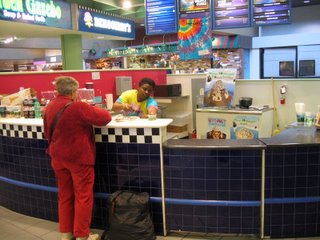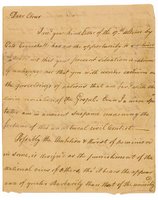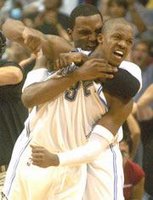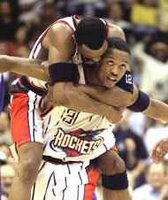The first photo was of Gilbert Rawlins:
After Rawlins, he profiled:
Michele Code and Isaiah Tenorio (Nov. 23)
Marjorie Eliot (Nov. 16)
Rafael Gonzalez (Nov. 9)
Crispin Cortes and James De La Vega (Nov. 2)
And today's was Angelo Painu.







 Last week, New York's Swann Galleries auctioned off one of the rarest and most important African-American and American literary artifacts, a signed letter (front page shown at left) by the first published Black poet in the United States (and the second woman), Phillis Wheatley (c. 1753-1784). This is the only letter of Wheatley's every to have gone on auction. As news commentator Ed Gordon remarks on his NPR News and Notes radio program, Wheatley was born in Senegal and sold into slavery to the family of John Wheatley of Boston in 1761. By 1767, she had published her first poem in the Newport, Rhode Island Mercury, and in 1773, she published her landmark collection, Poems on Various Subjects, Religious and Moral (London: Printed for Archibald Bell and Sold in Boston by Cox and Berry, engraving from frontispiece show below), which, before it could gain subscriptions (which was the way most books were sold in those days) required an "attestation" to her authorship by various prominent White residents of Boston.
Last week, New York's Swann Galleries auctioned off one of the rarest and most important African-American and American literary artifacts, a signed letter (front page shown at left) by the first published Black poet in the United States (and the second woman), Phillis Wheatley (c. 1753-1784). This is the only letter of Wheatley's every to have gone on auction. As news commentator Ed Gordon remarks on his NPR News and Notes radio program, Wheatley was born in Senegal and sold into slavery to the family of John Wheatley of Boston in 1761. By 1767, she had published her first poem in the Newport, Rhode Island Mercury, and in 1773, she published her landmark collection, Poems on Various Subjects, Religious and Moral (London: Printed for Archibald Bell and Sold in Boston by Cox and Berry, engraving from frontispiece show below), which, before it could gain subscriptions (which was the way most books were sold in those days) required an "attestation" to her authorship by various prominent White residents of Boston.Dear ObourI rec.d your kind Letter of the 17th ultimo by Cato Coggeshall; had not the opportunity to see him. I doubt not that your present situation is extremely unhappy; nor that you with wonder exclaim on the proceedings of nations that are fav.d with the divine revelation of the Gospel. Even I a mere spectator am in anxious suspense concerning the fortune of this unnatural civil Contest.
Possibly the ambition & thirst of Dominion in some is design'd as the punishment of the national views of others, tho' it bears the appearance of greater Barbarity than that of the uncivilz'd (page 2) part of mankind. But Let us leave the Event to him whose wisdom alone can bring good out of Evil & he is infinitely superior to all the Craftiness of the enemies of this seemingly devoted Country. This is handed to you br Mr. Lingo, with whom I and Mr. Quamine I passed the last evening very agreeably.
Dutiful respects to Mr. Hopkins & family and believe me to be your affectionate
P. Wheatley
Providence Feby 14, 1776
The Swann gallery catalogue notes that Wheatley addressed this letter to Obour Tanner, her friend and "sister" slave; from what I can tell, several of the names mentioned in it (Cato, Mr. Quamine, which sounds Akan, like Quabena/Quamina, etc.) seem to point to West African origins, so she's referring to fellow Black New Englanders in it.
The letter, which was estimated to sell for between $80,000 and $120,000 eventually sold for $253,000 to an anonymous bidder. As Felicia Lee reports in her New York Times Arts Briefly article,
That price, which includes a 15 percent commission, was the highest ever paid at auction for a letter written by an African-American, and appears to have set an auction record for a letter written by a woman, said Jeremy Markowitz, an autograph specialist at Swann Galleries in New York, which sold it. The two-page letter is considered especially valuable because in it Wheatley talks about the American Revolution, and obliquely about slavery, and because it was written to an enslaved friend, Obour Tanner, in Newport, R.I. "This is a happy day for those of us who love African-American literature," said Henry Louis Gates Jr., chairman of the department of African and African-American studies at Harvard.
***
They just never cease their tireless work in this Land of Freedom, these moral arbiters. Our own American Taliban, also known as the Citizens for Literary Standards in Schools, are indefatigable. What do I mean? Once again they're trying to ban, er, remove/opt out of having young people read texts they find objectionable. What's objectionable about these texts? you ask? Well, according to these moral censors, these works of fiction and nonfiction are "salacious," and they charge that they're being assigned as "required" reading.
Here's the list:
She watched two African-American children playing in the museum, and it dawned on her that in another time they would have been slaves. "They had no choice," she said. "They had no power."
And after learning that at one time 20 percent of New Yorkers were enslaved, the artist said, she went to the lobby of the grand Historical Society building and began imagining the past. "I'd look around and look around," she said, "and one in five people would be a slave."
 Yet Minaya actually bade for Delgado last season, losing him when the 12-year Toronto player chose the Marlins because he didn't like Minaya's overzealous appeal to his Latin heritage. Nevertheless, as the lone Latino GM in the league, the Dominican-born Minaya has initiated a Latino-focused renovation of the Mets, bringing in future Hall of Fame pitcher Pedro Martínez, who was the team's most consistent starter (with his 15-8 win-loss record, 2.82 ERA and 208 strikeouts), and Houston's breakout outfielder Carlos Beltrán, who was a bit of a letdown. The Mets were actually in the division and wild-card races until an August slowdown, but with Delgado's bat in the lineup, they should be able to generate more runs, which was one of their major weaknesses. Delgado also provoked some outcry in 2004 when he refused to take the field for the 7th-inning performances of "God Bless America," fielding hearty boos in 9/11-attacked New York. But the brouhaha about Delgado's courageous anti-war and pro-Vieques stand has died down, and he encountered far less hostility this past season. With anti-Iraq War sentiment becoming more widespread across the US, he ought to have almost no problems on this account this upcoming season.
Yet Minaya actually bade for Delgado last season, losing him when the 12-year Toronto player chose the Marlins because he didn't like Minaya's overzealous appeal to his Latin heritage. Nevertheless, as the lone Latino GM in the league, the Dominican-born Minaya has initiated a Latino-focused renovation of the Mets, bringing in future Hall of Fame pitcher Pedro Martínez, who was the team's most consistent starter (with his 15-8 win-loss record, 2.82 ERA and 208 strikeouts), and Houston's breakout outfielder Carlos Beltrán, who was a bit of a letdown. The Mets were actually in the division and wild-card races until an August slowdown, but with Delgado's bat in the lineup, they should be able to generate more runs, which was one of their major weaknesses. Delgado also provoked some outcry in 2004 when he refused to take the field for the 7th-inning performances of "God Bless America," fielding hearty boos in 9/11-attacked New York. But the brouhaha about Delgado's courageous anti-war and pro-Vieques stand has died down, and he encountered far less hostility this past season. With anti-Iraq War sentiment becoming more widespread across the US, he ought to have almost no problems on this account this upcoming season. It'll be especially interesting to see if Minaya decides to go after Manny Ramírez (at left, with his son, Manny Jr.) one of the best hitters in either league but also a frequently decried malcontent who's seeking a trade from the Boston Red Sox, whom he helped lead to the 2004 World Series championship. Ramírez has repeatedly asked for trades in the past, and has been dogged by allegations of not playing hard or being too distracted at times. He is claiming that playing in the Red Sox's media fishbowl prevents him from having enough privacy, but he wouldn't improve on this in New York, where he grew up (and starred at George Washington High School, in New York's Washington Heights neighborhood). Ramírez would do better to pick an out-of-the-way team with playoff potential and a very understanding manager, like the Cardinals or this year's World Champions, the Chicago White Sox. Both teams could use his bat, and both teams' nutty managers would be able to deal with Manny's intermittent dramas.
It'll be especially interesting to see if Minaya decides to go after Manny Ramírez (at left, with his son, Manny Jr.) one of the best hitters in either league but also a frequently decried malcontent who's seeking a trade from the Boston Red Sox, whom he helped lead to the 2004 World Series championship. Ramírez has repeatedly asked for trades in the past, and has been dogged by allegations of not playing hard or being too distracted at times. He is claiming that playing in the Red Sox's media fishbowl prevents him from having enough privacy, but he wouldn't improve on this in New York, where he grew up (and starred at George Washington High School, in New York's Washington Heights neighborhood). Ramírez would do better to pick an out-of-the-way team with playoff potential and a very understanding manager, like the Cardinals or this year's World Champions, the Chicago White Sox. Both teams could use his bat, and both teams' nutty managers would be able to deal with Manny's intermittent dramas. Rutgers, the State University of New Jersey, is the United States' 7th oldest university, with a long and distinguished history that dates back to 1766. Yet Rutgers, which was one of the early football pioneers along with fellow New Jersey school Princeton, has long been one of the NCAA Division I-A Big East's football also-rans (despite the obviously fit players pictured at right). Even though several of that league's powerhouse teams, like Miami, Virginia Tech, and Boston College, left a year ago, Rutgers still has had a losing record over the last decade against remaining Big East opponents such as West Virginia, Syracuse, and Pittsburgh. In fact, Rutgers posted a 37-game losing streak from 1991-1995, and has lost blowouts to Division I-AA teams. ESPN Page 2 fans ranked this five-year stretch of defeatists as the worst college football team of all time (and this includes some other doozies). Yet after defeating the University of Cincinnati today 44-5, they achieved a winning 6-4 record (which includes defeats of Syracuse and Pittsburgh), and are set to make their first return to a bowl game since 1978. Since the 6th-ranked University of Notre Dame Fighting Irish defeated Stanford University's Cardinal today, they will gain a Bowl Championship Series (BCS) bid. Had they lost, through an arrangement with the Big East, they'd get one of that league's non-BCS bowl bids. Rutgers will thus be invited to participate in the Insight Bowl, against Arizona State, which was, oddly enough, its opponent in 1978.
Rutgers, the State University of New Jersey, is the United States' 7th oldest university, with a long and distinguished history that dates back to 1766. Yet Rutgers, which was one of the early football pioneers along with fellow New Jersey school Princeton, has long been one of the NCAA Division I-A Big East's football also-rans (despite the obviously fit players pictured at right). Even though several of that league's powerhouse teams, like Miami, Virginia Tech, and Boston College, left a year ago, Rutgers still has had a losing record over the last decade against remaining Big East opponents such as West Virginia, Syracuse, and Pittsburgh. In fact, Rutgers posted a 37-game losing streak from 1991-1995, and has lost blowouts to Division I-AA teams. ESPN Page 2 fans ranked this five-year stretch of defeatists as the worst college football team of all time (and this includes some other doozies). Yet after defeating the University of Cincinnati today 44-5, they achieved a winning 6-4 record (which includes defeats of Syracuse and Pittsburgh), and are set to make their first return to a bowl game since 1978. Since the 6th-ranked University of Notre Dame Fighting Irish defeated Stanford University's Cardinal today, they will gain a Bowl Championship Series (BCS) bid. Had they lost, through an arrangement with the Big East, they'd get one of that league's non-BCS bowl bids. Rutgers will thus be invited to participate in the Insight Bowl, against Arizona State, which was, oddly enough, its opponent in 1978. University High School consists of two small rooms on the third floor of an office building wedged between a Starbucks and an animal hospital on Route 1 in south Miami. Inside are three desks, three employees and two framed posters from art museums on the wall.
Promotional brochures say diplomas can be earned in four to six weeks, with open-book exams, no classes and no timed tests. A diploma costs $399, no matter how many courses.
In paperwork filed with the state of Florida, the school says it has six teachers. None of the school's graduates interviewed, however, mentioned dealing with anyone besides Kinney, the current owner, and none said they had received any personal instruction.
John M. McLeod, a Miami-Dade Community College educator, is identified as the University High principal on a letter welcoming new students. McLeod said he met Simmons in the 1970's, but that he had no connection to University High. He said his signature had been copied.
"I've never seen this letter," he said. "I know nothing about University High School."
Simmons said he did not know why McLeod's signature was on the letter.
Former students said in interviews that courses consisted of picking up work packets from University High and completing them at home. Grades they received on the packets counted the same on their transcripts as a yearlong high school course.
"If it was history, they had the story with the questions right next to it," Simpson said. "They were one-page stories. It wasn't really hard."
University High says its textbooks are the Essential Series from Research and Education Association of Piscataway, N.J., but their publisher describes them as study guides.
"You wouldn't describe them as textbooks," Carl M. Fuchs, president of Research and Education, said. "You would say they're more supplemental, but they can be used on their own. A textbook is certainly going to have a lot more text, a lot more information."
Beasts of No Nation leaves the reader with one resonant, beautiful sentence that captures everything the author has set out to say. That sentence deserves to be read in the full context of this universal soldier's story.
As Brazil marked its annual black pride day yesterday, black activists at the launch of TV da Gente celebrated the new channel. "TV da Gente will reproduce, for the first time, the true image of the people," said Netinho de Paula. "It's a huge victory for us all: for the black movement, for the white movement, for the red movement and for the Brazilian people."





• 4:00-6:00pm Study Abroad on the Bowery: Visiting Professor Samuel R. Delaney $10/$5 student/Free SAB St. Marks Workshop Samuel R. Delany is the winner of multiple Hugo and Nebula awards and one of science fiction's most celebrated authors. Born and raised in New York City, Delany began writing in the early 1960s. His 1966 novel Babel-17 established his reputation, and over the next decade he became famous for his provocative futuristic explorations of race and sexual identity in the novels Nova (1969), Dhalgren (1975) and Triton (1976). His other works include the Neveryòn series of novels (1979-87) and the novel Stars in My Pocket Like Grains of Sand (1984). He has also written frankly about his life as an African-American homosexual, and his non-fiction books include The Motion of Light and Water: Sex and Science Fiction Writing in the East Village, 1957-65 (1988) and Times Square Red, Times Square Blue (Sexual Culture) (1999).
Where normal malicious code might be content to choose a deceptive file name, a rootkit "hooks" operating system calls that might reveal its presence, and essentially reprograms them to lie -- like bribing the coroner to conceal a murder.
And the lie the First 4 Internet code tells is a whopper. Under the program's influence, Windows will deny the existence of any file, directory, process or registry key whose name begins with "$sys$." Russinovich verified this by making a copy of Notepad named "$sys$notepad.exe," which promptly vanished from view.
That means that any hacker who can gain even rudimentary access to a Windows machine infected with the program now has the power to hide anything he wants under the "$sys$" cloak of invisibility. Criticism of Sony has largely focused on this theoretical possibility -- that black hats might piggyback on the First 4 Internet software for their own ends.
potentially opens the door for websites to take control of a PC, a Finnish researcher Muzzy has noticed. An ActiveX control installed by First4Internet Ltd, the British company that devised XCP, allows remote systems full access.
By deliberately corrupting the most basic functionality of their customers' computers, Sony broke the rules of fair play and crossed a bright line separating legitimate software from computer trespass. Their actions may be civilly actionable.
Sony may even have committed a crime under the U.S. Computer Fraud and Abuse Act, which can carry fines and prison terms for anyone who "knowingly causes the transmission of a program ... and as a result of such conduct, intentionally causes damage, without authorization, to a protected computer." Corrupting Windows so it misreports the contents of a hard drive sounds a lot like "damage," and the click-wrap license agreement on the Sony disk amounts to pretty thin "authorization" -- disclosing only that "this CD will automatically install a small proprietary software program ... intended to protect the audio files embodied on the CD."
 Nothing is easier to post in the midst of a snowstorm of required reading than sports-related news, so here goes.
Nothing is easier to post in the midst of a snowstorm of required reading than sports-related news, so here goes. Pujols (at right with his 4-year-old son Albert Jr.) is only 25 years old and has already made his mark as one of the great batters of all time. If he stays healthy and even moderately approaches the level of his first five years, he will go to the Hall of Fame. His tally for his half decade in the major leagues is as follows:
Pujols (at right with his 4-year-old son Albert Jr.) is only 25 years old and has already made his mark as one of the great batters of all time. If he stays healthy and even moderately approaches the level of his first five years, he will go to the Hall of Fame. His tally for his half decade in the major leagues is as follows: A recent issue of ESPN: The Magazine (with Phil Jackson and Kobe Bryant on the cover) has an interesting article on NBA basketball players Orlando Magic guard Steve Francis (at left, being embraced by Mobley) and the Los Angeles Clipper's Cuttino Mobley. The two are so close that there have been rumors that they...are lovers. In fact, when Mobley was traded from the Magic last year, Francis had a breakdown of sorts. As the AP reported back then
A recent issue of ESPN: The Magazine (with Phil Jackson and Kobe Bryant on the cover) has an interesting article on NBA basketball players Orlando Magic guard Steve Francis (at left, being embraced by Mobley) and the Los Angeles Clipper's Cuttino Mobley. The two are so close that there have been rumors that they...are lovers. In fact, when Mobley was traded from the Magic last year, Francis had a breakdown of sorts. As the AP reported back thenBut Francis took the departure of his backcourt partner hard.
"I can't put it into words," he said. "Playing with a guy, living with a guy, just knowing that every day when I wake up that's something I can count on, that I'm going to be in practice or in a game with Cuttino.
"Him not being here is going to be tough for me. I don't know what I'm going to wake up for."
"They messed up something that started so good, man," said Francis, an All-Star the past three seasons. "I don't feel there was a need to break something up just because he was going to be a free agent and you don't want to pay him at the end of the season.
"You should have known that when you traded for him, so you should have made that decision then."
***
"He's been with Cuttino for six or seven years now, and so it's like losing someone close to you," [Coach] Davis said. "It's a very emotional time for Steve, and I understand that."
***
"You don't wait 30 minutes before a game to tell a guy he's traded," Francis said. "The way you handle relationships, for me, is going to change the way that I approach the game, more businesslike than anything."
 The ESPN article delves in a bit deeper, talking about how very close these two, handsome young things (cf. at right, all up on each others' backs) were:
The ESPN article delves in a bit deeper, talking about how very close these two, handsome young things (cf. at right, all up on each others' backs) were:
"In Philly they got their first furs together. In Atlanta they bought belts by the fistfull, two of each because each knew if he liked something, then the other would too. Once they went to LA and had lunch at the oh-so-trendy Ivy, staying for more than three hours."
...
"'People would get upset because we were just off to ourselves,' Mobley says, cracking into a pitying smile. 'There's even people who said, "They're gay." Definitely heard that one. On the radio, on the Internet. They don't realize that when you can hug a guy, and say I love him and he's my brother, that's not gay. That's just being a man. We're just two guys who really understand each other."

 Punks by John Keene
Preorder your copy today! (Out in December 2021!)
Punks by John Keene
Preorder your copy today! (Out in December 2021!)
 Counternarratives by John Keene (UK Edition)
Order your copy today!
Counternarratives by John Keene (UK Edition)
Order your copy today!
 Letters from a Seducer by Hilda Hilst, translated by John Keene, with an introduction by Bruno Carvalho
Get your copy today!
Letters from a Seducer by Hilda Hilst, translated by John Keene, with an introduction by Bruno Carvalho
Get your copy today!
 The Obscene Madame D by Hilda Hilst, translated collaboratively by Nathanaël and Rachel Gontijo Araújo, with an introduction by John Keene
Get your copy today!
The Obscene Madame D by Hilda Hilst, translated collaboratively by Nathanaël and Rachel Gontijo Araújo, with an introduction by John Keene
Get your copy today!